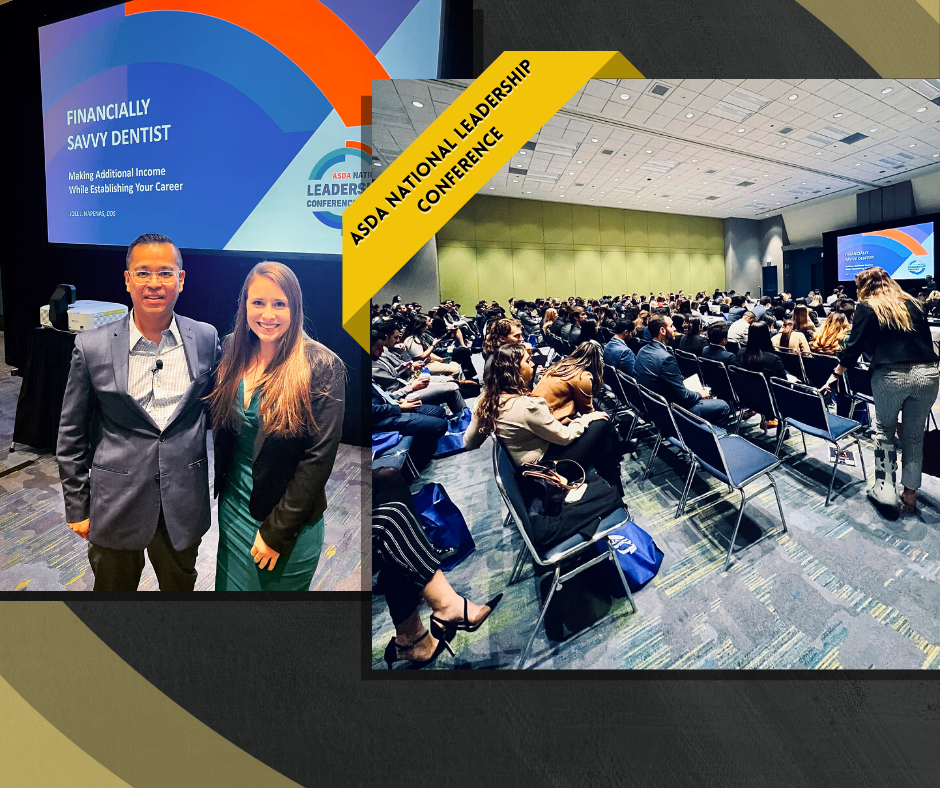Things I Wish I Knew When I Was Starting My Career

I had the privilege last week to speak to a group of dental students at a national meeting in Chicago last week. I was asked to talk about how you build wealth and earn income outside of and in addition to dentistry.
I remember when I was a dental student solely focused on just getting through dental school, I thought that on the other side of it was a career that was going to afford me a good income and that everything else would be taken care of afterward.
However, regardless of whether you are a blue-collar worker, or being groomed to be a high-income earning professional, most of us have been conditioned and prepped for the following general cycle: get a well-paid job/career → spend most of your waking hours grinding it out at work to earn enough to fulfill your basic needs and pay down your debts → start splurging to enjoy the fruits of your labor in the little spare time that you have → put a little bit aside and hope that it is enough some time to pay for large ticket items and retire in the future → rinse and repeat for 30-40 years.
While dentistry is a career that pays very well compared to many others, these young new dentists are facing unique challenges. First, they are coming in with record amounts of student debt (I had previously established that the average dentist would have to devote 9000 working hours, or 4.7 working years to solely pay off their student loans). Second, income for dentists’ has not increased at the same rate as inflation and tuition. Third, dentistry is becoming one with increased competition from private equity and large DSOs. Though real wealth is generated through dental practice ownership, the incoming generation of dentists is relegated to being employees rather than owners of their businesses.
So with the increased costs of living, debt burdens, and lack of autonomy, it is absolutely essential that these young dentists, even at the beginning of their career, learn more about being a steward of their money and earning income outside of dentistry. While their dental income is the foundation of meeting their basic needs, it should also serve as a means to fund their additional wealth-building and income-generating pursuits.
Rather than splurging on luxury vehicles and vacations at the first five to six-figure paychecks, put portions of it aside and accumulate so it can be invested in things that will build your wealth and generate income that is not directly dependent on your job and your precious time. These investments can even be ones on yourself, such as further education, mentorship, and/or coaching that will teach you how to do this.
You then invest and accumulate assets that would include traditional publicly traded equities (i.e.: stocks and bonds), however, will also include investments in businesses, real estate, and alternative assets.

Does it require additional time and effort on the front end? Absolutely. But dentists are already used to dedicating additional time and effort, having sacrificed four (sometimes up to 8) additional years of education, and tens of thousands of dollars. That additional time and sacrifice are what elevated them to being six-figure earners, compared to those who do not have the same level of education and are mid to low five-figure earners (median individual income in the United States is $37,000).
Additional time and effort on the front end can further elevate you and potentially distinguish you as a seven-figure or more earner with an eight-figure net worth, versus the average six-figure earner dentist with a low seven-figure net worth, that is relegated to spending 40-60 hours a week in their practice/job for 30-40 years.
I wish that as a dental student I was introduced to these concepts early. As I had previously mentioned, I was introduced to the book ‘Rich Dad, Poor Dad’ when I was a dental student, however, I dismissed it because I did not know any better. Thus, it is never too early (or in my case, too late) to learn these concepts.
Financial literacy and learning how not to prematurely mortgage your future time for instant gratification is the first step. This is followed by learning how to and how much you need to set aside to invest. Third is acquiring the skills to invest and accumulate assets that will generate passive income, and build your wealth.
The ultimate purposes of all this are to free up your time, contribute more of your time, talents, and resources to meaningfully help others, be present and make memories with your loved ones, and live the life and vocation of your dreams.
If you want to talk about how you can build and preserve wealth and generate passive income like the ultra-rich, set up a time to talk with me

Download a copy of our free e-book here to learn how dentists and other professionals can replace their income by passively investing in real estate.
Subscribe to our email newsletter here.
Visit our Facebook and LinkedIn pages, or join our newsletter mailing list for articles, updates, and opportunities.